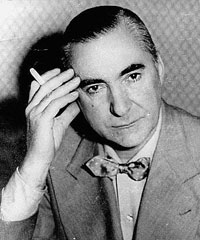
Curzio Malaparte (Italian pronunciation: [ˈkurtsjo malaˈparte]; born Kurt Erich Suckert; 9 June 1898 – 19 July 1957) was an Italian writer, filmmaker, war correspondent and diplomat. Malaparte is best known outside Italy due to his works Kaputt (1944) and The Skin (1949). The former is a semi-fictionalised account of the Eastern Front during the Second World War and the latter is an account focusing on morality in the immediate post-war period of Naples (it was placed on the Index Librorum Prohibitorum).
During the 1920s, Malaparte was one of the intellectuals who supported the rise of Italian fascism and Benito Mussolini, through the magazine 900. Despite this, Malaparte had a complex relationship with the National Fascist Party and was stripped of membership in 1933 for his independent streak. Arrested numerous times, he had Casa Malaparte created in Capri where he lived under house arrest. After the Second World War, he became a filmmaker and moved closer to both Togliatti's Italian Communist Party and the Catholic Church (though once a staunch atheist), reputedly becoming a member of both before his death.[1][2][3]
- ^ Maurizio Serra, Malaparte: vite e leggende, Marsilio, 2012, estratto
- ^ Senza disperazione e nella pace di Dio, Il Tempo, 20 luglio 1957.
- ^ "Malaparte, Curzio". Istituto dell'Enciclopedia Italiana.